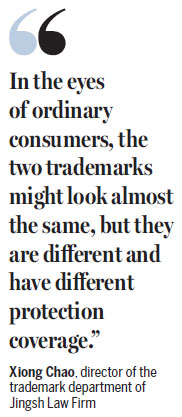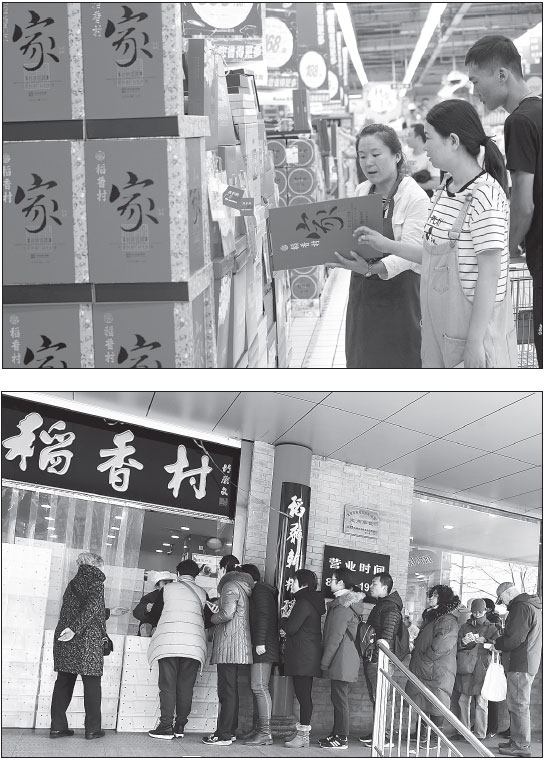High court expected to hear pastry trademark battle
Suzhou, Beijing companies both use well-known Daoxiangcun characters
Two companies, one in Beijing and one in Suzhou, both famed for their Daoxiangcun-branded pastries are embroiled in a legal battle to see which of them has the right to use the trademark.
So far different courts have issued opposite rulings in a case revolving around the well-known pastry trademark Daoxiangcun, resulting in extensive discussions about intellectual property rights protection.
On Oct 12, the Suzhou Industrial Park People's Court ruled in favor of Daoxiangcun Food headquartered in Suzhou, Jiangsu province, ordering the plaintiff Beijing Daoxiangcun Foodstuff to stop using the Chinese characters for Daoxiangcun in its pastries packaging and pay 1.15 million yuan ($166,970) in damages and expenditure.
Yet about a month ago, the decision by the Beijing Intellectual Property Court was the opposite, preventing the Suzhou pastry maker from using Daoxiangcun to mark its mooncakes, pastries and zongzi, a traditional festival snack of glutinous rice dumplings wrapped in bamboo leaves. The compensation granted to Beijing Daoxiangcun was 30 million yuan.

The companies have both registered trademarks including the Chinese characters for Daoxiangcun, which explains in part why they could win on their home turf.
"In the eyes of ordinary consumers, the two trademarks might look almost the same, but they are different and have different protection coverage," China News Service quoted Xiong Chao, director of the trademark department of Jingsh Law Firm, as saying.
Commenting on the latest court ruling, CNS reported that the Suzhou company said it continues to believe it has the best case, based on the years it has been in business and the date it registered its trademark.
Suzhou's Daoxiangcun was born in 1773 during the Qing Dynasty (1644-1911) and gained the praise of Emperor Qianlong. In comparison, Beijing's Daoxiangcun began to be sold during Emperor Guangxu's reign (1871-1908).
But Cao Siyuan, an executive at the Beijing company's branding department, told CNS that the Suzhou ruling is not the final word, adding that "we will wait and see the final ruling".
Beijing Daoxiangcun told The Paper that because Daoxiangcun Food used the logo highly similar to its own, consumers mistook Suzhou-made pastries as Beijing-made ones.
The two local courts have their own grounds for making their rulings, so the Supreme People's Court is expected to further clarify how to distinguish between the two Daoxiangcun trademarks, Liu Dongyang, a Beijing attorney, told Beijing Business Today.
"A complex combination of historical, realistic, legal and market factors" contributed to this legal wrangle between two pastry leaders from the south and north of China, Chi Xiangdong, deputy general manager of Beijing Daoxiangcun, said at a news conference in 2016, when his company decided to initiate legal proceedings against its Suzhou rival.
In the past, there were more than 10 pastry businesses all called Daoxiangcun across the country, but just these two have survived.
Both of them have strong reputations in their respective regions, and both claim to have the right to use their trademarks.
After China's first Trademark Law came into effect in 1982, a pastry trademark including Daoxiangcun was registered by another food company in Baoding, Hebei province. This was later transferred to the Suzhou company.
The Beijing company registered a different Daoxiangcun trademark for use in pastry derivative products in 1997 and it applied for the pastry trademark of Beijing Daoxiangcun in 2010. Its filing was granted in 2015.
In 2006, Daoxiangcun Food from Suzhou applied for a new trademark, still containing Daoxiangcun yet framed in a fan shape. Challenged by the Beijing company, the Suzhou company's application was rejected.
And so the saga continues.
Experts said that the e-commerce boom also partially explained the currently heated competition over the brand, as it has broken originally geographical boundaries and expanded the reach of both businesses.
Gu Huanyu, an expert on branding, told Beijing Business Today that the key to the dispute is for the parties to protect their market position and commercial interest.
He suggested the two companies focus on long-term development and explore new markets, rather than becoming entangled with the trademark legacy left over from history.
|
Above: Beijing residents purchase Daoxiangcun-branded pastries. Wang Zhuangfei / China Daily Top: A saleswoman promotes Suzhou-made Daoxiangcun mooncakes at a supermarket in Beijing in September. Provided To China Daily |
(China Daily 10/18/2018 page17)















